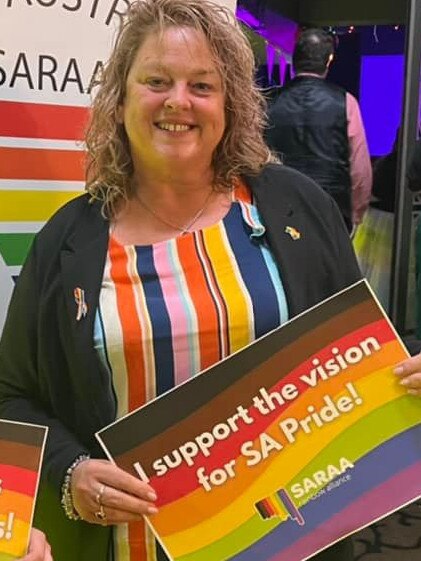Adelaide man endured conversion therapy for close to a decade before finding acceptance
Russell was 21 years old when he was first subjected to conversion therapy after turning to his church for help. Now there are calls to ban the harmful tactic.

SA News
Don't miss out on the headlines from SA News. Followed categories will be added to My News.
An Adelaide man who endured exorcisms and attempts to “pray the gay away” says he battled with his mental health for a decade as a result of his trauma.
Russell was 21 years old when he was first subjected to conversion therapy at Youth With a Mission in Goulburn in 1990 – a group which has since been disbanded.
“They told me that they love me and accept me but that they needed to cast this homosexual demon out,” said Russell, who did not want his surname used.
“I was told to lay down and everyone gathered around to lay their hands on me and prayed to expel this demon from me. Some part of me did want it to work.”
As a life-long Christian, Russell’s struggle to come to terms with his sexuality began as a teenager, when leaders at his church made it very clear being gay was something that was unacceptable.
“Back then I didn’t know anyone who was gay so I turned to my church for help,” he said.
“It didn’t take long before I understood that this was something I shouldn’t talk about.”
Russell’s commitment to his faith lead him to pursue a religious career, working with various mission groups across the country, including Cornerstone Bible College which referred him to a “counselling group” which could help him address his sexuality.

The St Clair resident also spent five agonising years attending weekly sessions run by an “ex-gay” man – someone who believes they have successfully changed their sexual orientation.
“It was like a 12-step Alcoholics Anonymous program but for gay people,” Russell said.
“After five years I kind of gave up. It’s not that I had accepted being gay, it was more that I had accepted I was going to be eternally damned.”

Cornerstone national director Andrew Vincent said the organisation had undergone significant reform since the early 2000s.
“We believe all people are made in the image of God and we should do everything we can to help people become the best version of themselves,” Mr Vincent said.
Russell, 53, spent the next decade of his life wrestling with his faith and battling with his mental health after being diagnosed with depression and anxiety.
“Most days I would struggle to get out of bed or even eat, which meant I found it quite hard to hold down a job as well,” he said.
“This messaging that I was going to hell had been drilled into my head, because I failed to change who I was, and that is what caused a lot of my problems.”
The introduction of marriage equality in 2017 allowed him to find “comfort within himself” and showed him that he could be “loved and accepted.”
Russell has found a home at Bowden’s Activate Church which moved away from the Pentecostal denomination in 2016 in order to be fully inclusive to all communities.
“We knew that there were churches within the denomination that had begun to partner themselves with groups which were against marriage reform,” Activate’s community director Anthony Castle said.
“I have spoken with at least a dozen people in the last year who have gone through these conversion experiences. We try to offer a safe space for all people.”
“It was like a breath of fresh air to finally find a Christian church who were supportive of LGBTIQ+ people,” Russell said.
No matter ‘treatment’, scars can last a lifetime
MemberS of the LGBTIQA+ community exposed to conversion therapy to change their sexuality or gender identity are at greater risk of negative mental health outcomes, a South Australian expert says.
Flinders University psychology professor Damien Riggs said that conversion therapy survivors often dealt with debilitating shame and high levels of anxiety and depression, because of their struggle with their gender or sexuality.
“To LGBTIQA+ people, conversion therapy reinforces that there’s something shameful about their gender or sexuality,” Mr Riggs said.
“Internal responses or external responses to their sexuality and gender can have severe negative psychological consequences.”
A 2020 study from the Williams Institute at UCLA School of Law found that LGBTIQA+ people who had gone through conversion practices were twice as likely to experience depression and suicidal thoughts.
Mr Riggs acknowledged that the practices could come in many forms and as a result the recovery for victims could vary but for some it could take a lifetime to move past their trauma.
“The classic conversion therapy was presenting people with images of a person, that according to the administrator they shouldn’t be attracted to, and administering either emetic drugs or electric shocks,” he said. “More often these days it takes the form of shaming and behavioural messaging.
“Trauma associated with the punitive approaches (threats, physical coercion, physical harm) can take people a lifetime to recover from because it is a trauma akin to that of domestic violence or family violence.”
Survivors want legal ban on conversions
Advocates for conversion therapy survivors and the LGBTIQA+ community say they are in discussions with the state government on legislation to have the discredited practice banned.
The South Australian Rainbow Advocacy Alliance has met with survivors, researchers and a representative from the Attorney-General’s department to outline different legislative bans that have been implemented across the country.
The alliance’s policy and project officer, former state MP Kelly Vincent, said her organisation gave a detailed explanation of legislation which passed through the Victorian parliament in February last year.

The Victorian Change or Suppression (Conversion) Practices Prohibition Act 2021 included a broad definition of conversion, which encompassed formal and informal practices.
It included four criminal offences in addition to civil options for survivors.
“A lot of survivors are more keen on civil action and some do want to pursue legal charges. I think sometimes when we are too prescriptive on what the outcome is we can honestly traumatise people more,” Ms Vincent said.
“It is important to remember that for a lot of survivors, part of their conversion experience was actually recruiting people as well, so a lot of them do live with a lot of guilt.
“We need to ensure that survivors feel involved in the conversation and I guess that’s where the new (South Australian) government is at the moment, looking at the research that exists and what model survivors are most comfortable with.”
Queensland and the ACT also have enacted bans.
Human Services Minister Nat Cook said discussions with survivors and advocacy organisations were a “critical part of developing the government’s response to conversion therapy” and would ensure it understood their “experiences and views”.
Conversion therapy – referred to as conversion practices by survivors – is an umbrella term used to describe attempts to “convert” people from diverse sexual and gender identities to an exclusively heterosexual and cisgender identity, a La Trobe University report said.
An Alliance survey last year of 623 LGBTIQA+ South Australians revealed that ending harmful and damaging conversion practices was the most important issue for the community, with 85 per cent of participants rating it as extremely or very important.
Prior to the state election, Premier Peter Malinauskas – then Opposition Leader – wrote to the alliance and confirmed that Labor was “fundamentally opposed to the practice of conversion therapy” and would work to see it does not continue in SA.
Attorney-General Kyam Maher said: “Labor remains committed to ensuring this practice does not occur in South Australia and is working to deliver on another election promise.”
Ms Vincent said conversion practices could come in many forms and were not only administered by religious leaders but also psychologists, counsellors, medical practitioners and family members.
“It’s really important that we find legislation that can capture all the areas where this might be occurring and all the different methodology on which it occurs,” she said.



